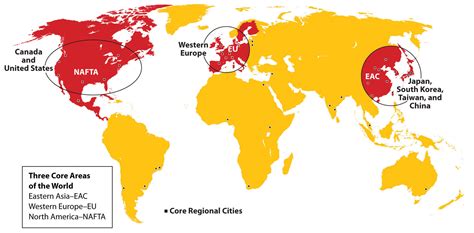Understanding the Power Dynamics

The relationship between core and periphery nations is characterized by an imbalance of power. Core nations possess superior economic, political, and military resources, while periphery nations are often dependent on core nations for trade, investment, and security. This power imbalance allows core nations to exert influence over periphery nations and shape their economic and political development.
Mechanisms of Control
Core nations employ various mechanisms to maintain their dominance over periphery nations:
Economic Exploitation
Core nations control key aspects of the global economy, including trade, investment, and finance. They use their economic power to:
- Extract raw materials and cheap labor from periphery nations: This provides corporations with access to resources and profits at the expense of local communities.
- Dump manufactured goods in periphery nations: This undercuts local industries and limits economic diversification.
- Impose economic policies that benefit core nations: These policies often favor foreign investors and corporations over domestic businesses and workers.
Political Subordination
Core nations often interfere in the political affairs of periphery nations to ensure their interests are met. This can involve:
- Supporting repressive regimes: Core nations may provide economic and military aid to authoritarian regimes that align with their own interests.
- Ousting or manipulating governments: Core nations may use covert or overt operations to influence elections or remove leaders that challenge their dominance.
- Creating international institutions: Core nations dominate international organizations like the UN and IMF, shaping global policies that favor their interests.
Military Dominance
Core nations maintain powerful militaries that give them the ability to:
- Coerce periphery nations: The threat of military intervention can compel periphery nations to comply with core nation demands.
- Occupy or control territory: In extreme cases, core nations may invade or occupy periphery nations to secure access to resources or strategic locations.
- Fund and support armed groups: Core nations may provide weapons and training to rebel groups or government forces in periphery nations to further their own agendas.
Impact on Periphery Nations
The dominance of core nations has significant consequences for periphery nations:
- Economic dependency: Periphery nations become reliant on core nations for trade, investment, and technology. This can stifle economic growth and undermine national sovereignty.
- Social inequality: Economic exploitation intensifies social stratification, leading to widespread poverty and inequality.
- Political instability: Core nation interference undermines democratic institutions and exacerbates political conflict.
- Environmental degradation: The extraction of resources from periphery nations often results in environmental destruction and pollution.
Resisting Core Dominance
Periphery nations have historically sought to resist core nation dominance through:
- Nationalization of resources: Asserting control over natural resources and industries can reduce economic dependency.
- Regional cooperation: Forming alliances with neighboring countries can strengthen bargaining power and counter external influence.
- Non-aligned movements: Refusing to align with either core nation blocs can provide some political independence.
- Social movements: Grassroots organizations mobilize citizens to demand economic justice and political change.
Conclusion
The relationship between core and periphery nations is a complex and evolving dynamic. Core nations wield significant power over periphery nations, exploiting them economically, politically, and militarily. This domination has severe consequences for periphery nations, including economic dependency, social inequality, political instability, and environmental degradation. However, periphery nations have demonstrated resilience and agency in resisting core nation dominance, seeking to achieve greater economic, political, and social justice.
